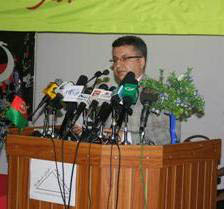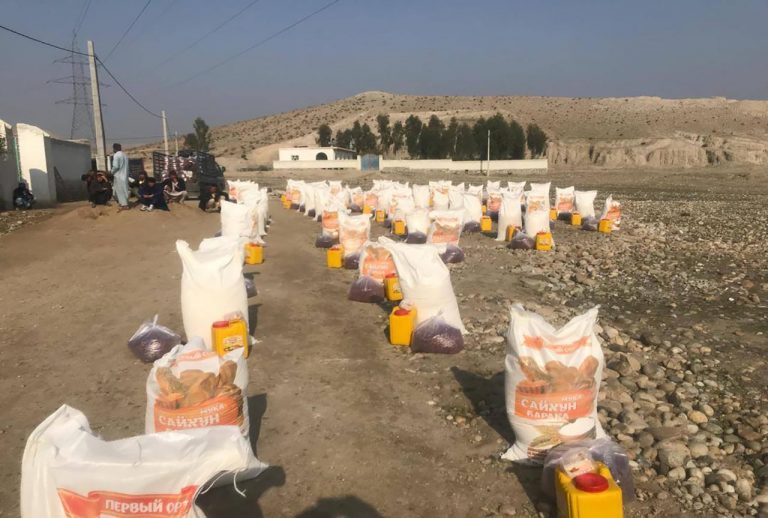Access to information is one of the main needs of the Afghan society. Widespread corruption, lack of attention to the demands of citizens for information during the past elections, lack of useful, strong, relationship of confidence relationships between Afghan citizens and the Afghan state are the main negative results of this lack of information in Afghanistan.
 During the past six years, the Civil Society and Human Rights Network (CSHRN) organized a number of dialogues related to access to information and its role in the Afghan society. To work on this issue, CSHRN organized an analytical symposium on access to information on 29 May 2009 in Mazar-e-Sharif.
During the past six years, the Civil Society and Human Rights Network (CSHRN) organized a number of dialogues related to access to information and its role in the Afghan society. To work on this issue, CSHRN organized an analytical symposium on access to information on 29 May 2009 in Mazar-e-Sharif.
The participants of the symposium discussed access to information and proposed ways on how to implement it in Afghanistan. During the symposium, Afghan intellectuals presented analytical articles, illustrating different perspectives on the role of access to information and democratization. During the symposium, the participants suggested CSHRN to work on a draft law on access to information. Consequently, a working group of four persons was elected to work on a such a draft. The members of the working group are: Mr. Sayeed Mohammad Islami, a famous religious scholar, Mr. Rahim Ibrahim, a professor of journalism at Balkh University, Mr. Taqhi Wahedi, an well known Afghan writer and human rights activist, and Mr. Kawa Sahab, a law expert. The working group in Mazar-e-Sharif elaborated a first draft law on access to information during the eight months following the symposium.
Having the first draft law on access to information, CSHRN started to discuss this draft with civil society, state institutions and Afghan intellectuals and academics all over the country.
CSHRN has defined five steps in its action plan on dialogues for the law on access to information:
1- Step: The working group on the law of access to information presented the draft of the law to civil society, some state institutions, academics and human rights activists in Mazar-e-Sharif in March 2010.
 2- Step: The draft law will be presented to the same kind of audience in the city of Herat in May. For this purpose, a representative of the working group will travel to Herat to present the draft law and to facilitate a broad discussion on it.
2- Step: The draft law will be presented to the same kind of audience in the city of Herat in May. For this purpose, a representative of the working group will travel to Herat to present the draft law and to facilitate a broad discussion on it.
The second analytical symposium on access to information, which is called: “Access to information – its role in the promotion of democracy and human rights in Afghanistan”.
The second analytical symposium on access to information, called “Access to information – its role in the promotion of democracy and human rights in Afghanistan”, will be conducted in Kabul city this June or July. During that symposium, Afghan parliamentarians will present analytical articles on the following issues:
1- The role of access to information in the promotion of the culture of parliamentarism.
2- The role of access to information in strengthening the rule of law in Afghanistan.
3- The role of access to information in the promotion of human rights.
4- The role of access to information in strengthening transparency and accountability in Afghanistan.
These four analytical articles will be debated by the participants of the symposium.
The parliamentarians will also receive the draft law of access to information in order to provide inputs and comments. The secretariat of CSHRN will organize meetings with the parliamentarians in order to collect their feedbacks.
3- Step: A broad discussion on the first draft law will be organized in Kabul city between July and August with representatives of civil society, intellectuals, human rights activists, the Afghan Independent Human Rights Commission, representatives of the government and the parliament. Their feedback will be integrated into the draft law by the working group.
4- Step: The working group will travel to the historical city of Bamyan in August 2010 in order to organize a dialogue with civil society, human rights activists, state authorities, the provincial council and academics on all the inputs received from other parts of the country up to that point.
5- Step: During September and October, the enriched draft law will be presented in the eastern part of the country in Jalalabad city during a broad meeting with representatives of civil society, universities, state institutions, the provincial council and the media of Nengarhar Province.
The main goal of these five step program is to enrich and legitimize the draft law on access to information through broad based dialogues throughout the country. In close collaboration with the CSHRN secretariat, the working group will constantly collect all the feedback received through the dialogues in order to provide a fairly complete first draft law.
A special edition of Angaara Magazine on access to information
The CHSRN’s bi-monthly journal Angaara will permanently debate the issue of access to information. Special attention will be put on the analytical articles from the parliamentarians and interviews with main actors of media and civil society will be conducted and published in July – August 2010. The special edition of Angaara will also include some successful examples of access to information programs from other parts of the world. CSHRN website www.cshrn.af
Articles, news, debates and interviews concerning access to information draft law and CSHRN programs on access to information will be published on the CSHRN website. Equally, the regional offices of CSHRN will provide information collected concerning the draft law which will be published on the website www.cshrn.af 
The human rights radio program “The Voice”
The CSHRN human rights radio program “The Voice” will organize live debates on access to information and the role of a respective law in Afghanistan. Representatives of civil society, media, parliament, state and academics will be invited to the debates. In each program, a member of the working group will present the idea of the draft law on access to information.
Weekly Killid Journal
The weekly Killid journal aimed at families, will discuss in close cooperation with CSHRN the needs of a law on access to information in a very simple and understandable language. A special page in Killid will be devoted to access to information and its role in the democratization in Afghanistan.
Special weekly radio program on access to information
The Radio Rabae Balkhi in Mazar-e-Sharif has started a weekly radio debate on access to information in Afghanistan with the cooperation of the North regional office of CSHRN. The radio program will invite the participants of the earlier symposium on access to information in Mazar-e-Sharif to provide information about the law on access to information to the radio listeners. The radio will also organize debates on access to information and the current situation of Afghanistan. The radio program will be accessible through the CSHRN website for Afghan people with the country but also for the ones living outside of Afghanistan.
During all the different steps, the offices of CSHRN will permanently organize debates on access to information and democracy with CSHRN member organizations. CHSRN will also encourage the Afghan national media, -radio programs, TV channels, newspapers, journals and websites – to address the issues of access to information in a continuous manner.



